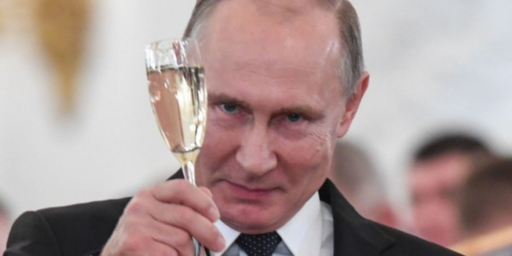Why China and Russia Don’t Do Soft Power
Joseph Nye, the man who coined the term “soft power” to distinguish how states can wield power other than by coercion or purchase, weighs in at Foreign Policy on why Russia and China’s essays into soft power have fallen flat so far:
The soft power of a country rests primarily on three resources: its culture (in places where it is attractive to others), its political values (when it lives up to them at home and abroad), and its foreign policies (when they are seen as legitimate and having moral authority). But combining these resources is not always easy.
Establishing, say, a Confucius Institute in Manila to teach Chinese culture might help produce soft power, but it is less likely to do so in a context where China has just bullied the Philippines over possession of Scarborough Reef. Similarly, Putin has told his diplomats that “the priority has been shifting to the literate use of soft power, strengthening positions of the Russian language,” but as Russian scholar Sergei Karaganov noted in the aftermath of the dispute with Georgia, Russia has to use “hard power, including military force, because it lives in a much more dangerous world … and because it has little soft power — that is, social, cultural, political and economic attractiveness.”
I think that one of China’s problems in harnessing soft power to further its goals is that nobody wants what the Chinese leadership wants other than the world’s worst dictators.
Over the last decade or so we’ve done a pretty masterful job of undermining our own soft power. We might want to think about how we might go about remedying that and what the costs of reducing our soft power might be.






Well, aside from our culture (Kardashians and reality TV), values (or, inconsistency in applying them), and foreign policies (invading other countries with or without Security Council backing) we’re right on track.
The title of this post is not correct. In fact, China invests heavily in soft power – there is no emerging economy that spends more on that. There are the international versions of CCTV, the state owned broadcasters, as well investments in things like English Language Newspapers like China Today.
Al Jazeera did some weeks a good report about CCTV´s work in Africa.
http://www.aljazeera.com/programmes/listeningpost/2012/12/2012121917283722970.html
Russia also has it´s own international channel, RT(Formerly Russia Today). What Nye is arguing is that these efforts aren´t being successful.because these countries sees soft power as propaganda. People trust the BBC World Service(and things like France 24 and Deustch Welle) because it has independence, but they do not trust CCTV and RT because they are propaganda outlets of authoritarian Regimes. Nye is arguing that only if these outlets manages to get independence they are going to be successful.
@James Joyner:
Our culture is still pretty popular. I mean, we live in a world were we can make a movie basically saying “RAH! RAH RAH! The USA is AWESOME!!!” and it does better overseas than it does in our own country.
Do you think people would line up to see Captain China or Captain Russia?
Russia(And other Soviet Republics), by the way, has a vibrant musical scene. It´s something REALLY impressive and sophisticated, it´s easily the most underestimated country in the World regarding that. You can find musical groups of all kinds of styles, and many of them are so creative that´s hard to find equivalents in the west(Мельница/Melnitsa, Звери/Zveri, Земфира/Zemfira and Flëur are among my favorites).
By using the amazing google machine and typing in “chinese investment in” (before you get to an actual continent — I intended to choose “africa”) you find that the PRC has built railroads and highways and bought agricultural land and is training Africans in agriculture across vast swaths of that place.
Maybe our music scene and movies are more loved. But they seem to be doing pretty well in ways that they choose. Mr Nye and Dr Schuler should probably not congratulate themselves prematurely.
oderint dum metuant (“let them hate, so long as they fear”)
@Andre Kenji: No shout outs for Pussy Riot?
More on topic:
Agreed. I certainly hope our elected officials take this into account when making decisions. We used up our goodwill pretty quickly after 9/11 which has left us with much less influence than before.
@Franklin: Pussy Riot is much more about a group of political activists than Musicians. But Russian rock and pop music is good, and underestimated in the West.
http://www.youtube.com/watch?v=1f-zaCroSO4
http://www.youtube.com/watch?v=2nLkAOv5t80